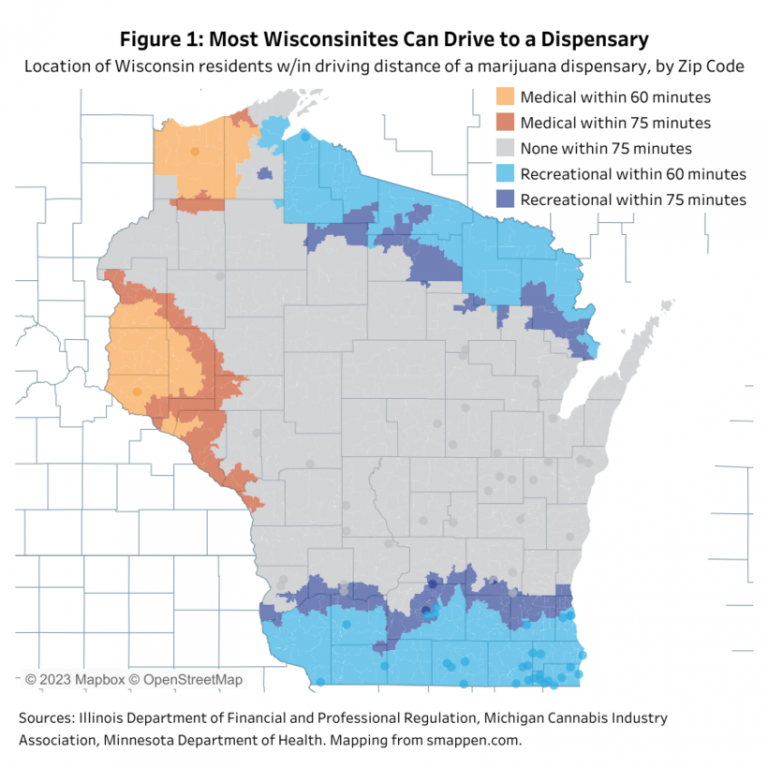Half of State’s Adults Live Within 75 Minutes of Marijuana Dispensary
Pot is widely available, study finds, but Wisconsin isn't regulating or collecting taxes on it.
It’s unclear whether Wisconsin Republicans will consider any proposal to legalize medical marijuana in the next state budget, with GOP leaders sending mixed signals on the issue last month.
Both Illinois and Michigan allow for recreational use of cannabis. Minnesota has approved medical marijuana, but state leaders are poised to approve recreational use this year.
“It’s essentially an availability of a product without any sort of the enforcement mechanisms,” said Ari Brown, senior research associate at the Wisconsin Policy Forum. “Of course, it is still illegal to transport the drug across state lines. But to the extent that that can actually be enforced, I think we’re seeing there’s this kind of readily available supply out there and it doesn’t seem to be precluding people.”

Wisconsin map showing zip codes that are a 60-minute and 75-minute drive to a legal marijuana dispensary in Illinois, Michigan or Minnesota. Courtesy of Wisconsin Policy Forum.
Brown said what this means for Wisconsin is that residents are likely buying cannabis products, but the state has no policy control over those sales and isn’t profiting from the tax revenue.
He said Michigan collected around $111 million in fiscal year 2021, putting it toward K-12 schools, transportation and funding for municipalities and counties.
That would also include taxes paid by visitors to the state. In Illinois, between 25 and 35 percent of monthly marijuana sales are to non-residents, according to the Policy Forum report. In 2022, Illinois brought in $445.3 million in state taxes from all weed sales.
With neighboring states moving more quickly on legalization, Brown said it’s hard to say whether non-resident sales would be significant in Wisconsin if marijuana was legalized. He said the state does draw a significant number of tourists and could win over out-of-state customers depending on the tax structure and the prices.
“A lot of people focus on what kind of revenue might come from some sort of recreational law, but I think the regulatory structure is just as important,” he said. “It’s where all of the other kinds of aspects of legalization carry with them some really important changes to the state.”
That could include allowing communities to opt out of allowing marijuana sales like Michigan’s system or letting municipalities impose a local sales tax like in Illinois. A state policy could also lead to providing resources to law enforcement to recognize drivers under the influence or creating public health messaging to encourage responsible use. Brown said Wisconsin would have the advantage of being able to learn from the systems in Michigan and Illinois if the state moved toward legalization.
“Things are very different, you know, in places that are located just a couple of minutes from each other,” he said. “And I don’t think that that’s something that should be discounted. I think that it can make for a really kind of confusing policy mix for individuals.”
Listen to the WPR report here.
Report: Half of Wisconsinites 21 and older live within 75 minutes of marijuana dispensary was originally published by Wisconsin Public Radio.
If you think stories like this are important, become a member of Urban Milwaukee and help support real, independent journalism. Plus you get some cool added benefits.
More about the Legalizing of Marijuana
- Hesselbein Will Revive Medical Marijuana Bill - Anya van Wagtendonk - Dec 16th, 2024
- Data Wonk: Will State Move to Legalize Marijuana? - Bruce Thompson - Sep 25th, 2024
- Data Wonk: Should Wisconsin Legalize Marijuana? - Bruce Thompson - Sep 18th, 2024
- Indigenous-Led Campaign Launches to Support Medical Marijuana - Isiah Holmes - Sep 4th, 2024
- How Delta-8 Impacts Marijuana Debate in Wisconsin - Richelle Wilson - Jun 18th, 2024
- Milwaukee Officials Praise Rescheduling of Cannabis by Biden - Isiah Holmes - May 20th, 2024
- What Will Wisconsin Do Now That Feds Are Moving to Ease Marijuana Restrictions? - Rich Kremer - May 2nd, 2024
- A Better Wisconsin Together Renews Call for Cannabis Legalization - A Better Wisconsin Together - Apr 20th, 2024
- Republicans’ Medical Marijuana Bill Is Likely Dead - Baylor Spears - Feb 18th, 2024
- The State of Politics: Why GOP Divided on Medical Marijuana - Steven Walters - Jan 15th, 2024
Read more about Legalizing of Marijuana here























If I were to drive with an open beer, I could be cited for having an open intoxicant. Why is it the same if I drive with a joint in my hand?